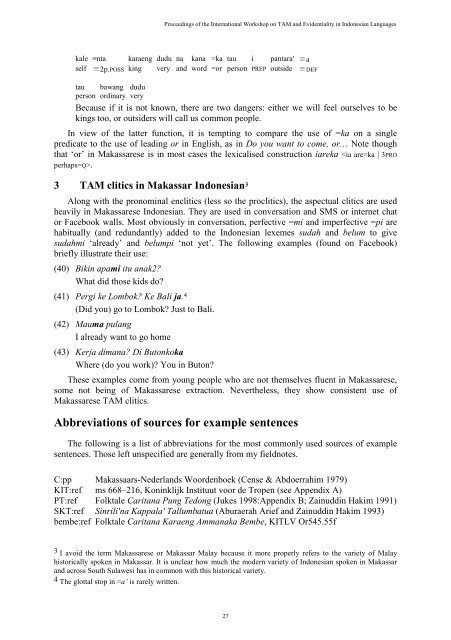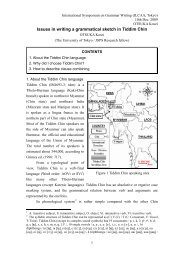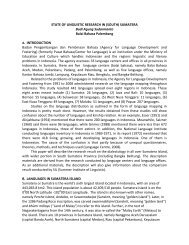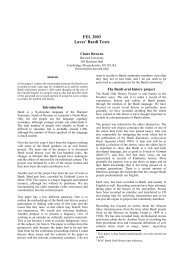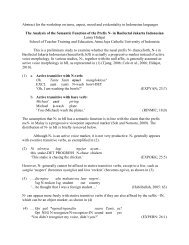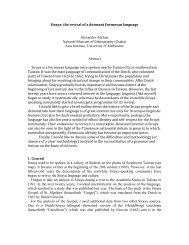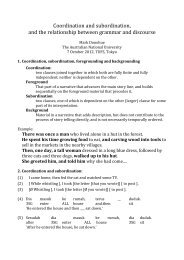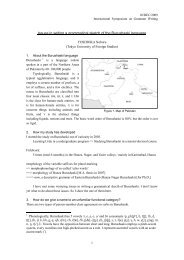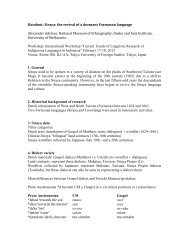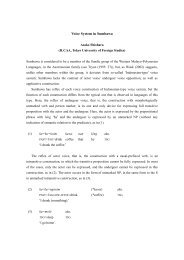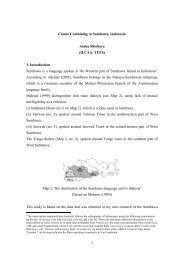Aspectual and modal clitics in Makassarese and Makassar Indonesian
Aspectual and modal clitics in Makassarese and Makassar Indonesian
Aspectual and modal clitics in Makassarese and Makassar Indonesian
You also want an ePaper? Increase the reach of your titles
YUMPU automatically turns print PDFs into web optimized ePapers that Google loves.
kale ≡nta karaeng dudu na kana =ka tau i pantara' ≡a<br />
self ≡2p.POSS k<strong>in</strong>g very <strong>and</strong> word =or person PREP outside ≡DEF<br />
tau bawang dudu<br />
person ord<strong>in</strong>ary very<br />
Because if it is not known, there are two dangers: either we will feel ourselves to be<br />
k<strong>in</strong>gs too, or outsiders will call us common people.<br />
In view of the latter function, it is tempt<strong>in</strong>g to compare the use of =ka on a s<strong>in</strong>gle<br />
predicate to the use of lead<strong>in</strong>g or <strong>in</strong> English, as <strong>in</strong> Do you want to come, or… Note though<br />
that ‘or’ <strong>in</strong> <strong><strong>Makassar</strong>ese</strong> is <strong>in</strong> most cases the lexicalised construction iareka .<br />
3 TAM <strong>clitics</strong> <strong>in</strong> <strong>Makassar</strong> <strong>Indonesian</strong> 3<br />
Along with the pronom<strong>in</strong>al en<strong>clitics</strong> (less so the pro<strong>clitics</strong>), the aspectual <strong>clitics</strong> are used<br />
heavily <strong>in</strong> <strong><strong>Makassar</strong>ese</strong> <strong>Indonesian</strong>. They are used <strong>in</strong> conversation <strong>and</strong> SMS or <strong>in</strong>ternet chat<br />
or Facebook walls. Most obviously <strong>in</strong> conversation, perfective =mi <strong>and</strong> imperfective =pi are<br />
habitually (<strong>and</strong> redundantly) added to the <strong>Indonesian</strong> lexemes sudah <strong>and</strong> belum to give<br />
sudahmi ‘already’ <strong>and</strong> belumpi ‘not yet’. The follow<strong>in</strong>g examples (found on Facebook)<br />
briefly illustrate their use:<br />
(40) Bik<strong>in</strong> apami itu anak2?<br />
What did those kids do?<br />
(41) Pergi ke Lombok? Ke Bali ja. 4<br />
(Did you) go to Lombok? Just to Bali.<br />
(42) Mauma pulang<br />
I already want to go home<br />
Proceed<strong>in</strong>gs of the International Workshop on TAM <strong>and</strong> Evidentiality <strong>in</strong> <strong>Indonesian</strong> Languages<br />
(43) Kerja dimana? Di Butonkoka<br />
Where (do you work)? You <strong>in</strong> Buton?<br />
These examples come from young people who are not themselves fluent <strong>in</strong> <strong><strong>Makassar</strong>ese</strong>,<br />
some not be<strong>in</strong>g of <strong><strong>Makassar</strong>ese</strong> extraction. Nevertheless, they show consistent use of<br />
<strong><strong>Makassar</strong>ese</strong> TAM <strong>clitics</strong>.<br />
Abbreviations of sources for example sentences<br />
The follow<strong>in</strong>g is a list of abbreviations for the most commonly used sources of example<br />
sentences. Those left unspecified are generally from my fieldnotes.<br />
C:pp Makassaars-Nederl<strong>and</strong>s Woordenboek (Cense & Abdoerrahim 1979)<br />
KIT:ref ms 668–216, Kon<strong>in</strong>klijk Instituut voor de Tropen (see Appendix A)<br />
PT:ref Folktale Caritana Pung Tedong (Jukes 1998:Appendix B; Za<strong>in</strong>udd<strong>in</strong> Hakim 1991)<br />
SKT:ref S<strong>in</strong>rili'na Kappala' Tallumbatua (Aburaerah Arief <strong>and</strong> Za<strong>in</strong>udd<strong>in</strong> Hakim 1993)<br />
bembe:ref Folktale Caritana Karaeng Ammanaka Bembe, KITLV Or545.55f<br />
3 I avoid the term <strong><strong>Makassar</strong>ese</strong> or <strong>Makassar</strong> Malay because it more properly refers to the variety of Malay<br />
historically spoken <strong>in</strong> <strong>Makassar</strong>. It is unclear how much the modern variety of <strong>Indonesian</strong> spoken <strong>in</strong> <strong>Makassar</strong><br />
<strong>and</strong> across South Sulawesi has <strong>in</strong> common with this historical variety.<br />
4 The glottal stop <strong>in</strong> =a’ is rarely written.<br />
27


